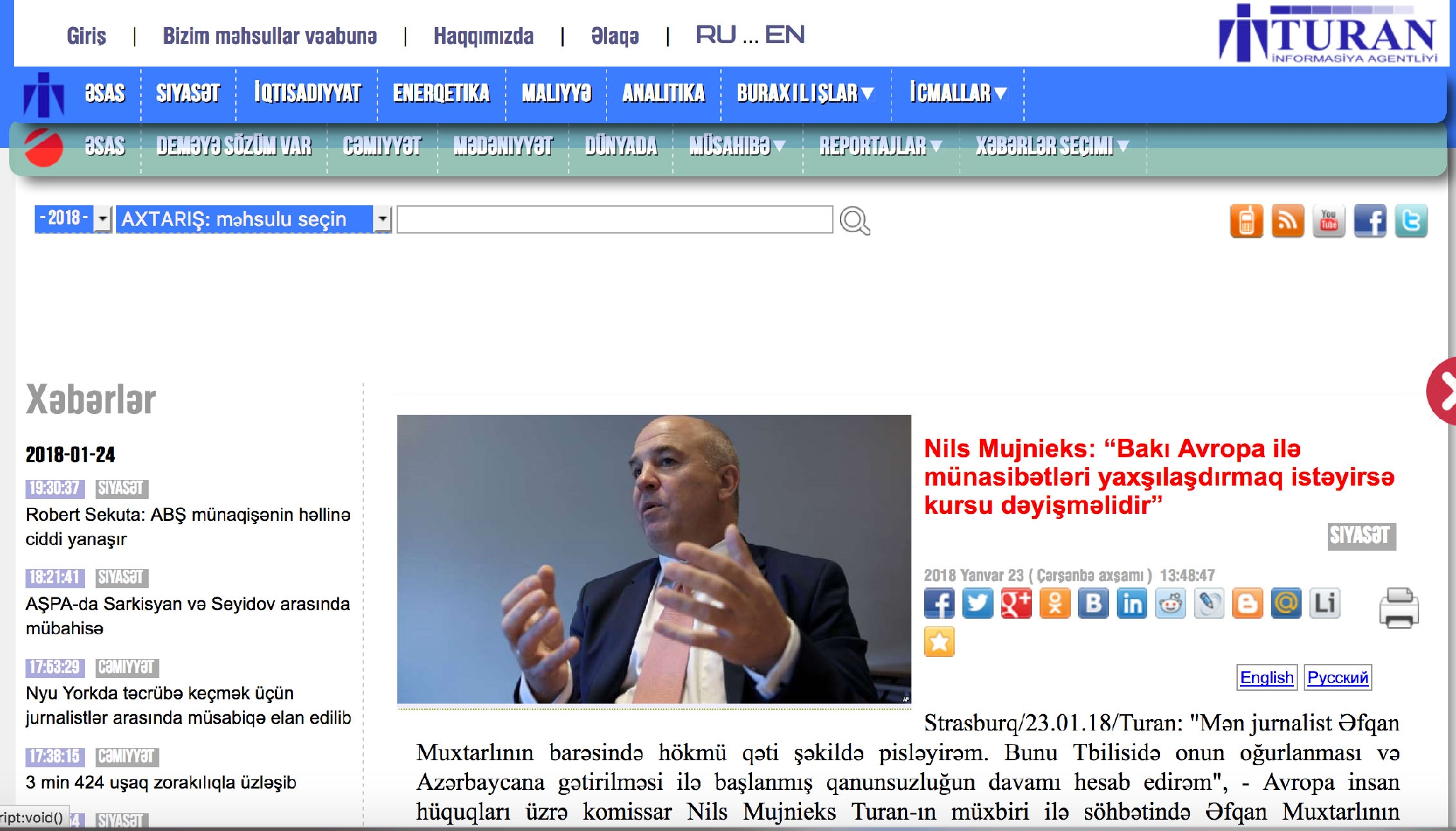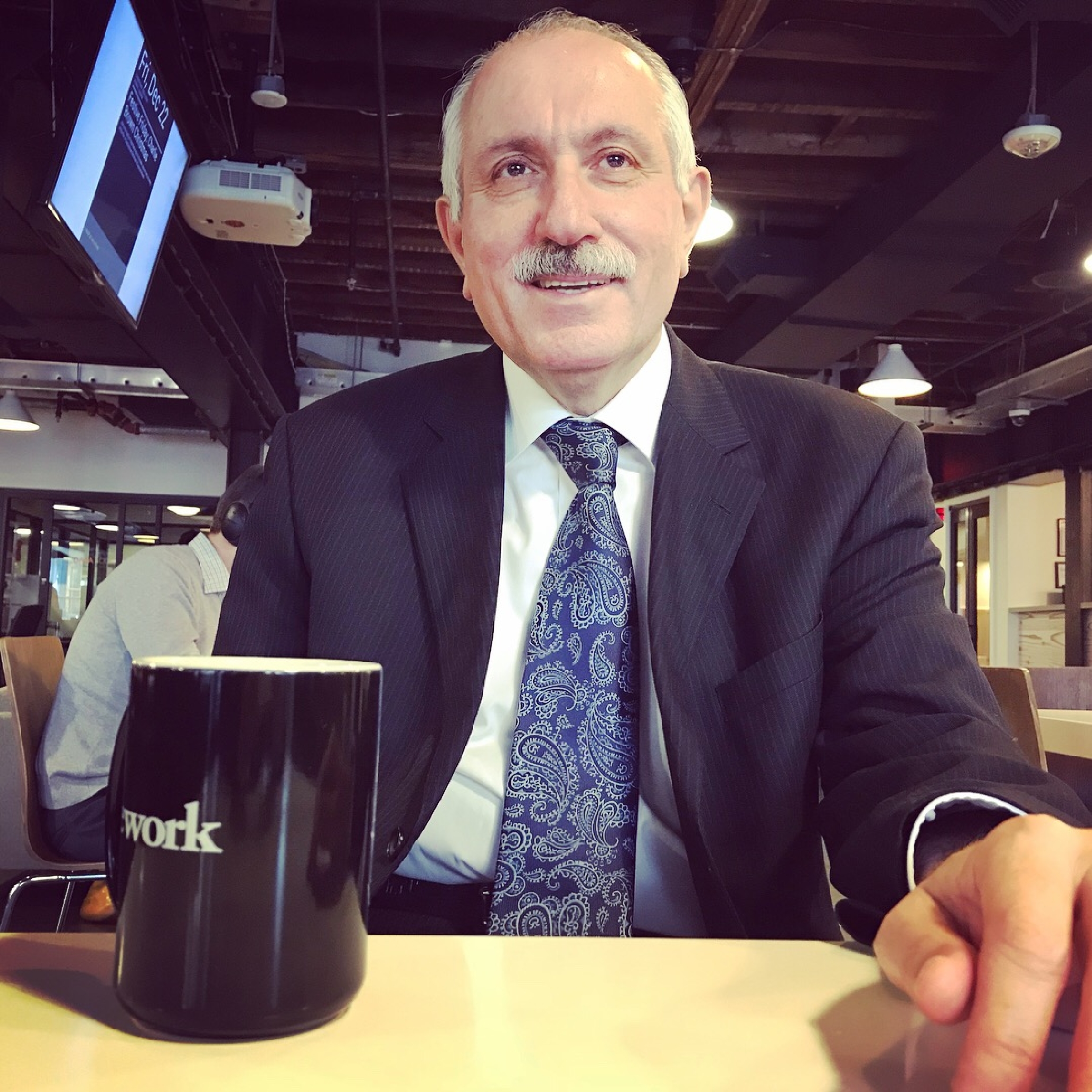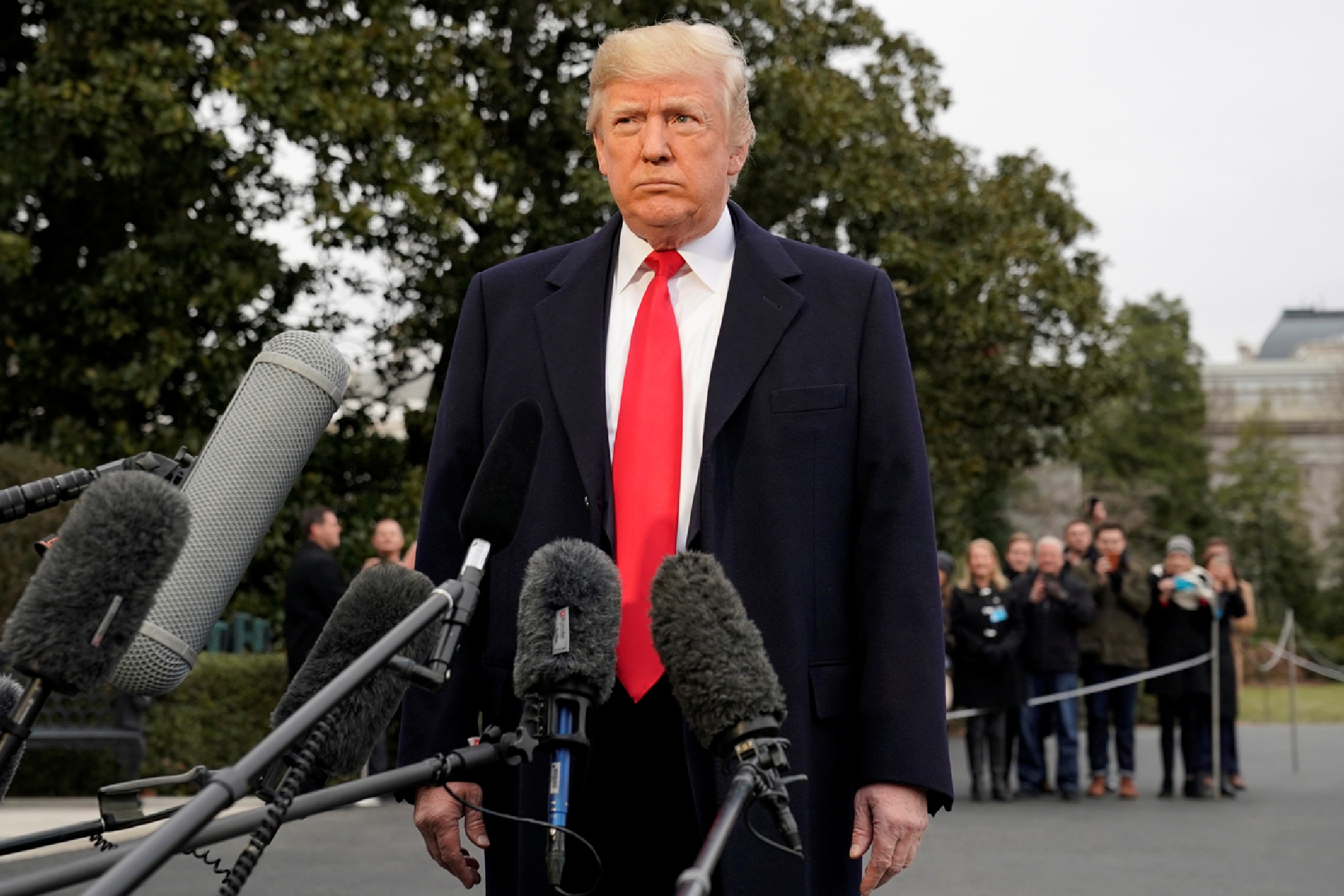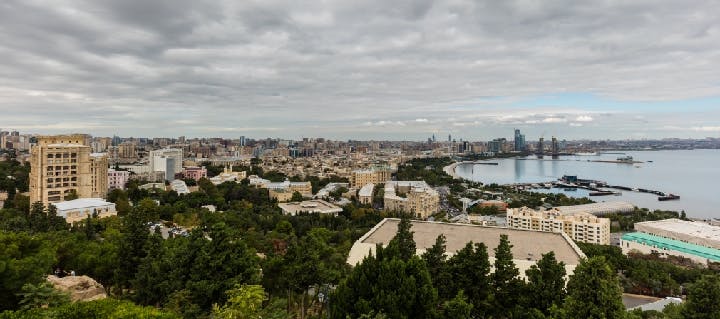Winter 2018
'Fake News' from Washington Echoes in a Baku Jail Cell
– Alex Raufoglu
For a journalist struggling to survive in an authoritarian society, President Trump’s “fake news” rebuke is bitingly ironic – and translates into real-life danger. Here is an exclusive telling of Mehman Aliyev’s story.
Mehman Aliyev chuckled when he heard it. He was locked in a dingy jail cell in Kurdakhani prison on the outskirts of Baku – a veritible home to many of Azerbaijan’s pro-democracy activists and journalists. He recalls that evening in early September 2017: he was reading an English textbook when he was suddenly interrupted by a litany of complaints coming from down the hallway. “The Washington Post is biased towards our country and our democracy. They have a particular political agenda and are trying to sell their lies about our government,” a man with a bulky voice repeated several times on TV. The American media, the show’s host added, and especially The Washington Post, is fake news!” “Even the Americans themselves acknowledge it,” he said.
It was probably the first time that Aliyev (no relation to the country’s eponymous ruling family) had paid attention to the small television lurking above the doorway at the end of the hall, he recalls. The director of Turan News Agency, Azerbaijan’s last remaining independent news outlet, he hadn’t watched domestic TV for years and had publicly criticized the government’s policy of airing only state-sponsored programs to push its propaganda. He had tried to tune out the sound of the television since his imprisonment following his arrest in August 2017 on charges of tax evasion and other offenses; it was a special instrument of torture for political prisoners like himself, he remembers thinking.
On this occasion, though, Aliyev’s curiosity was piqued. He gathered around the TV screen with other inmates, as the talk show’s host interviewed several members of the government-affiliated National Press Council, who were lambasting a Washington Post report as a “gross distortion of the truth.” Ironically, Aliyev recalls, neither the guests nor the talk show host mentioned which Washington Post article had presumably triggered their hour-long discussion. Soon, he learned from one of his lawyers that The Post’s editorial board had criticized his own arrest just days before the show aired. The op-ed was titled “In Azerbaijan, some journalists get free apartments. Others get jail cells.” It’s final line: “The truth cannot be jailed or bribed.”

A Disturbing Realization
Officials in Baku had quickly struck back, branding The Post a peddler of "fake news" – and citing U.S. President Donald Trump in doing so – in programming far beyond what Aliyev had happened to catch. “There is no way The Washington Post can be considered as an example of a free media,” said Ali Hasanov, the president’s aide for public and political affairs. “It’s not a coincidence that U.S. President Donald Trump has repeatedly accused The Washington Post of publishing false information, distorting facts, serving [the] interests of certain political groups, and specializing in fake news,” Hasanov continued. His full, unabridged statement was published in almost all of the country’s state-funded outlets, without any additional reporting to accompany it.
Back in jail, Aliyev remembers thinking about how pathetic the government’s understanding of independent media really was. He was only one of more than a dozen journalists imprisoned in Azerbaijan. The country’s press freedom record has deteriorated significantly during the past several years due to government-orchestrated antagonism against independent media, manifested as bogus legal charges, financial pressure, threats and intimidation, travel bans, and more. (The government’s campaign recently even reached beyond Azerbaijan’s borders.) Given the context, Aliyev says, Hasanov’s attack on one of the world’s most respected media outlets was deplorable, but not terribly surprising.
How biting an irony that in today’s world, enemies of press freedom do not only try to undermine a mainstream U.S. news outlet, but quote the sitting U.S. president as justification.
Far more disturbing was the realization in that moment that the United States, long considered the world’s leading democracy and, in general, a friend to independent journalists like himself, had given a dangerous and potent tool to repressive regimes like Azerbaijan – and those regimes would be only too happy to take it. How biting an irony that in today’s world, enemies of press freedom do not only try to undermine a mainstream U.S. news outlet, but quote the sitting U.S. president as justification.
“Convincing everyone that the journalists are lying so that you then can dismiss anything as lies… This whole narrative sounds as if the world has entered the post-truth era,” Aliyev told me.
The Story of Turan
Aliyev, 60, has been a champion of Azerbaijan’s independent media for a quarter-century. After briefly serving as public relations manager for the presidential administration in the early 1990s, he became instrumental in establishing media institutions in the post-Soviet country with the aim of safeguarding press freedom and the security of journalists. Characterized by his colleagues as an optimistic and motivated public intellectual, he is the co-founder of Azerbaijan’s National Press Council, the New Generation Journalism Union, the Baku Press Club, and a foundation named after murdered journalist Elmar Huseynov. In 2012, he was awarded by the Geneva-based Human Rights House Foundation for his “courageous and long-standing work for the freedom of expression.”
The idea of establishing Turan, the first independent news agency in the Soviet Union, goes back to 1990, when Azerbaijan was still a part of the Communist empire. At the time, Aliyev was reporting for Azerinform, the Baku branch of Soviet state agency news TASS. One winter morning in January of that year, a group of Communist officials broke into his newsroom and ordered the reporters to leave. “We can take it from here,” Aliyev recalls their shouting in Russian. Shortly after midnight on January 19, he learned that the Soviet troops had forcefully entered the city, killing more than 200 people. But the headlines the next morning were far from truthful. “Not even close,” Aliyev says. “Everything drafted by the government officials was fake – the actual fake news. I was even struggling to call it ‘news’ by any means.” That was an epiphany for Aliyev and his colleagues, who had been considering the dangerous step of establishing an independent news agency to skirt Communist propaganda instead of going to work for state-owned media. Turan was born that September.

Over the years, Turan developed into a major news source for the wider Caucasus region, bridging cultural, ethnic, and linguistic divides between audiences that often have limited access to local and regional news, especially on politically sensitive subjects such as human rights, corruption, and security. As a subscription service, Turan also cooperated with regional and international outlets, providing independent news and analysis in Azerbaijani, Russian, and English. Most of its reporters have also been contributors to international media outlets at the same time, an arrangement that has roiled Azerbaijani officials, particularly in recent years, as the government shuttered local branches of international press organizations and changed laws to further shrink the space for non-state media.
The situation became dire by the end of 2016, with almost all traditional media under strict government control. It was then that Aliyev decided to write a series of analytical articles on the state-sponsored crackdown in an effort to draw officials’ attention to the implications for national security and the country’s image abroad, he tells me.
“Due to forgetting liberal, democratic values, Azerbaijan is among the countries with rampant, high level[s] of corruption; [drug] trafficking; violation of private property rights, human rights, freedom of speech and expression, [and] the right to protection. [There is] overall total state control over society,” he wrote in December 2016. In other articles, he argued that economic hardships in Azerbaijan were the result of suppression of fundamental freedoms. “The policy of ignoring the… need [for] a broad presence of the independent spectrum [of] media and the tightening censorship of the internet… will strengthen authoritarian tendencies in the country and further exacerbate the crisis that is the result of suppression of freedom of speech and freedom in the broadest sense," he wrote.
Imprisonment – or Free Housing
A few months before his arrest, Aliyev says he was approached by several government officials. Their proposition: steady financing for Turan in exchange for loyalty. He refused the offer, yet decided to maintain communication with the authorities so that he could “explain to them first-hand the importance of independent media.” Aliyev later submitted his written suggestions to the government through mediators, he tells me, arguing that free, responsible, quality media outlets, such as Turan, were needed both inside the country and for the outside world as a source of credible information – especially at a time when next-door neighbor Russia was successfully installing its media outlets, including Sputnik, RIA Novosti, and Interfax, in Azerbaijan.
By targeting the last independent news source in the country, he insisted, the Azerbaijani government would, in large part, be handing over the nation’s media landscape to Russia. “Government media outlets, whether in Azerbaijan or in Russia, often use similar methods in producing disinformation for propaganda purposes – and no matter how our authorities see Turan, we are here to serve our society in part by cutting though the real ‘fake news,’” he told me.
Among his proposals to the government, Aliyev also suggested establishing the post of an independent press ombudsman. His arguments didn’t fall on receptive ears; instead, the government renewed its offer to buy Turan’s loyalty, he says, and he again rejected.
Soon, the Azerbaijani tax ministry opened an investigation against Turan and Aliyev was detained on August 24, 2017 on trumped-up tax evasion and abuse-of-power charges. The move came just days after he publicly criticized the government’s initiative to grant free apartments to journalists as a means to celebrate the country’s National Press Day. Turan’s reporters, Aliyev said in an interview with Radio Free Europe/ Radio Liberty’s Azeri service, had also been offered the possibility of free housing, but had rejected the clear conflict of interest. Following his detention, Turan's operations were briefly suspended.

Unlike some of his fellow journalists, Aliyev’s time in jail was not lengthy. He was released on September 11, shortly after U.S. Senator Dick Durbin proposed sanctions against the Azerbaijani officials involved in the arrest. Three months later, in December 2017, Aliyev visited Washington to meet with Senator Durbin and others who played a role in his release. “Pleased to see that he was released from dubious arrest and allowed to continue his important work. I hope the same will be done for others detained for political reasons. It’s a reminder of the critical importance of a free press to democracies,” the senator tweeted following the meeting. According to an updated list compiled by the Baku-based Center for the Protection of Political Prisoners, 14 journalists and writers remain behind bars in Azerbaijan.
A Newly Popularized Term
For Aliyev and his team in Azerbaijan, 2017 will be remembered as a year of absurdity. “Fake news,” the term that caught his attention in jail, was named the word of the year by the UK-based Collins English Dictionary. It defines the expression as “false, often sensational, information disseminated under the guise of news.” According to Merriam-Webster, the term has 19th-Century roots, but it will likely forever be associated with last year and President Trump, who made the term his trademark description of news stories or outlets that, in his opinion, treated him unfairly.
Reporters, academics, and commentators have also frequently referred to the term as they grapple with changing perceptions of the media. Some in the media sphere have called for the retirement of the term, including the authors of this opinion piece published by CNN, one of the primary recipients of the president’s “fake news” allegations. Thousands of miles from Washington, so too does Aliyev. That is not only because of the way the term has been employed (or, perhaps, deployed) by his own government.
Indeed, Azerbaijan is far from the only country in which officials have seized on the newly popularized term, in name or in spirit, to discredit Western, independent, or critical journalism. On its website, the Russian Foreign Ministry literally brands unfavorable stories with a red “FAKE” stamp. Among the straight news articles, there are opinion articles that simply disagree with, or question, the government’s actions. An article from The New York Times about the ministry’s stamp campaign is itself given the mark of ignominy.
Other examples abound from various corners of the globe:
“You can forge anything these days… We are living in a fake news era." - Syrian President Bashar Assad on reports of mass killings in the country’s prisons
"This is what we call 'fake news' today, isn't it?" - Venezuelan President Nicolás Maduro on international media coverage of his country
“They invented the fake news and concocted figures.” - Philippine President Rodrigo Duterte on allegations that he incited the killings of suspected drug-traffickers
"Fake news." - Spanish Foreign Minister Alfonso Dastis on reports of police violence against Catalonian protestors
“Let's FIGHT FAKE NEWS.” - Polish President Andrzej Duda on Twitter after reports that his wife snubbed President and Mrs. Trump
"There is no such thing as Rohingya. It is fake news." - U Kyaw San Hla, an officer from the state security ministry in Rakhine, Myanmar
"Trump is right, fake news is the enemy, something China has known for years" - op-ed headline in People's Daily, the official newspaper of the Chinese Communist Party
"Mr. Trump put the reporter of that media group in his place there." - Turkish President Recep Tayyip Erdogan on President Trump’s allegations that CNN produces “fake news”
“Donald Trump understands that [journalists] are an anarchic group.” - Cambodian Prime Minister Hun Sen on President Trump’s “fake news” allegations
“We have given telecommunication companies an order to block social media sites and they have agreed to it.” - Said Ali Muse, spokesperson for Somaliland’s election commission, on efforts to guard against “fake news”
The Committee to Project Journalists’ annual census found that a record 262 journalists were in jail around the world in 2017 “in relation to their work.” The group reported that “the number imprisoned on a charge of ‘false news,’ though modest, rose to a record 21.” Other media watchdogs, such as Paris-based Reporters Without Borders, have also raised concern over what appears to be an emerging trend: “By targeting journalists in this manner, the U.S. president ended a longstanding American tradition of promoting freedom of expression and sent a powerful message to media censors.”

U.S. Senator John McCain has joined the chorus of criticism: “Trump’s attempts to undermine the free press also make it more difficult to hold repressive governments accountable,” he wrote in a recent Washington Post op-ed. “For decades, dissidents and human rights advocates have relied on independent investigations into government corruption to further their fight for freedom. But constant cries of ‘fake news’ undercut this type of reporting and strip activists of one of their most powerful tools of dissent.”
The State Department had publicly criticized Aliyev's arrest and called for his immediate release. Recently, when asked whether the Trump administration bears responsibility for the fact that autocrats are directly referring to the president’s allegations of “fake news” as justification for their clampdowns, a senior State Department official told me: “This administration has made it clear over and over again that it strongly supports free speech, not only at home, but all around the world.”
Aliyev also harbors concern that while the term is being bandied about by Azerbaijani or other leaders for domestic political purposes, it can also be used to try to find common ground with the Trump administration.
The “fake news” narrative, Aliyev says, disturbs him on several levels: As well as serving as a quick and presumably presidential way to try to discredit reporting and media outlets, it also could be used to call into question standard journalistic practices, such as the judicious use of unnamed sources, and to amplify shortcomings, such as the occasional error. In some cases, he notes, the narrative serves to weaken journalism by referring to the claims and chatter on social media or non-journalistic platforms as “news,” whether “fake” or real. Aliyev also harbors concern that while the term is being bandied about by Azerbaijani or other leaders for domestic political purposes, it can also be used to try to find common ground with the Trump administration.
But he also knows, including from personal experience, that many journalists are weather-worn and battle-tested. Whether the label is “fake news” or something else, pressure on independent journalism and pressure on the truth itself will continue in much, if not all, of the world. Aliyev certainly didn’t need “fake news” to add to the difficulties of his work, but he acknowledges that solidarity and support is still out there, both domestically and from abroad. “We just have to keep working and keep relying on all the support we can get,” he says.
***
Alex Raufoglu (@ralakbar) is a Washington-based journalist and press freedom advocate who focuses on Eurasia. His reporting on governance, the media, human rights, and security issues has appeared in international news outlets. He represents Turan News Agency in the United States.
Cover photo: Baku's skyline (courtesy of Wikimedia Commons)
Up next in this issue
